Summary
How does woodland work help people in prison?
Offenders from HMP Winchester working with the Forestry Commission in Micheldever Wood
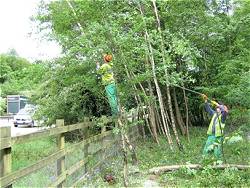
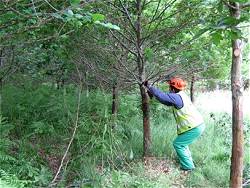
(Photos: Ben Phelan, Forestry Commission)
Summary
The Forestry Commission’s Offenders and Nature (O&N) scheme involves prisoners and probationers working alongside a supervisor on forest maintenance activities. The scheme is designed to help sentenced individuals gain industry-relevant skills, work experience and confidence to secure employment. Their work benefits the public and woodland biodiversity. Forest Research interviewed scheme stakeholders and participants to identify the impact of the scheme, its effectiveness at reducing re-offending and its cost-effectiveness.
Key findings
- Outdoors: being outdoors was important to many (but not all) participants
- Health: participants were aware of the all-round health benefits of the work
- Skills: tasks demand a mixture of independent and team work, and opportunities to test and improve skills
- Non-academic: many offenders have lower-than-average school qualifications, so O&N suits them as academic skills are less relevant than commitment, enthusiasm and diligence in following instructions
- Positive identify: as part of a workforce, offenders build a sense of self-worth and positive identify
- Employment: the skills and training help participants to access employment
Recommendations
- Paid placements: more opportunities for paid placements are important as a transition from volunteering; a lack of money is a major factor in re-offending
- On-the-job training: providing skills consolidation and work experience during a prison sentence, followed by a period of employment after release, is a key ingredient in assisting long-term employability
- Longer duration: short-term courses and work experience are valuable, but cannot deliver the same life-changing benefits as a long-term (minimum six months) work placement
- Being outdoors: working outside in the natural environment has special qualities and a positive effect on well-being as offenders find time and space to reflect and make positive changes in their lives
- Team work: close team work is a new experience for many participants, but the work supervisor must be able to motivate, nurture skills, maintain high standards and act as a role model and mentor
Publications
- Summary report – “Offenders and Nature: Helping people, helping nature
- Leaflet – “Employment for ex-offenders: an innovative approach”
Funding and partners
Commissioned and funded by the Forestry Commission.
Contact
Status
2006-2008.
Evidence base for ‘Offenders and Nature’ schemes
Factors addressed
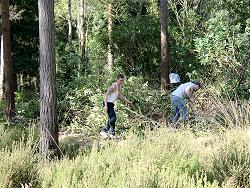
Probationers reducing undergrowth at Bedgebury Pinetum
(Photo: Julian Dormady, Forestry Commission)
‘Offenders and Nature’ (O&N) schemes are able to address several of the underlying factors for re-offending and have positive impacts on all involved as well as benefiting the wider public.
Causes of re-offending have been summarised as a combination of factors relating to:
- Poor education and training
- Lack of employment
- Drug and alcohol misuse
- Poor mental and physical health
- Problematic attitudes, thinking and behaviour
- Lack of life skills
- Inappropriate or no housing
- Debt and lack of financial support
- Poor or lack of family network.
O&N schemes are usually able to address the first six key factors listed above.
What do the schemes offer?
The schemes offer work experience outside amidst green space – a considerable change from the inside of a prison, and the many in-door based training schemes. Some offenders and supervisors observe a ‘calming’ and ‘focusing’ effect in volunteers.
Some O&N schemes explicitly use ‘ecotherapy’, which uses working in natural environments to support people with addiction problems and/or mental health issues, specifically drawing on this capacity of nature to calm, heal and inspire.
Potential benefits
To society and the environment
O&N projects use small teams which usually complete hard physical tasks with highly visible effects, such as ‘tidier’ looking and more open landscapes that allow locals and visitors to enjoy lovely views or benefit from, for example, a new path that is suitable for wheelchair access.
O&N schemes often tackle time intensive conservation work, such as opening up dense vegetation to create more diverse habitats. This important woodland managerial work would otherwise use scarce financial and human resources or remain undone due to resource constraints.
For participants
Most tasks require close working between two or three people, ensuring that they are done well and without endangering anybody. This also means that offenders have to closely follow health and safety guidelines and are valued and respected colleagues in their own right. Days spent outside working in all weathers also improve physical fitness.
Participants must be committed and reliable and get used to full-time work routines. This can be in stark contrast to a day inside prison or to being on a training scheme in a workshop or factory. It may not suit everyone; but those who get selected or want to give it a go, often not only learn new skills, but more importantly feel that they can do something that they enjoy and which also is appreciated by others.
O&N schemes can provide an intensive learning and skills programme – a mixture of general and specialist skills that suit land-based employment. Writing and numeracy skills are less prominent and thus not a barrier to becoming a good volunteer.
For offenders, good working relationships with scheme supervisors and employees also usually include receiving informal mentoring and the acquisition of life skills.
After completion
Some offenders realise that this type of work would suit them in the longer run and apply for college courses, apprenticeships or jobs in that field.
After successful completion of a voluntary placement, some O&N schemes offer short-term job opportunities for ex-offenders and these are particularly useful as a stepping stone to gaining further credentials and eventually gaining employment and rebuilding their lives.
Once having secured a job or training place, housing also becomes more affordable and easier to come by.
Anecdotal evidence
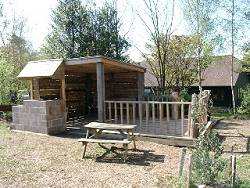
Using joinery and building skills of probationers to improve facilities at Bedgebury woodland
(Photo: Julian Dormady, Forestry Commission)
Internal appraisal of O&N projects suggest that they can have many profound and subtle impacts that benefit the offenders, the host organisation, the offender management institution and local communities.
Comments of foresters and conservationists working with young offenders include:
“The description of the person when we took them and what they were like with us did not match. They worked well and were reliable.”
“You could tell a difference in them from when they started and when they finished working with us.”
Some offenders bring back relatives after their release to show them their work. An ex-offender noted:
“Thank you for the opportunity it has given me in life that I may not have had. My time with the Forestry Commission has changed my outlook to life and work. I really believe for the first time I have a future.”
Issues
Some O&N schemes have experienced reluctance or even opposition to placing offenders as conservation volunteers on public land. For example, some locals have voiced their concern and disapproval about such schemes.
Similarly some staff members supervising and working with offenders are initially nervous and apprehensive. While some people naturally treat others as their equals and are good mentors, others need some time and support to develop new skills and management styles.
However, to date, in all such cases, both staff members and communities have been won over and observed the substantial positive effects such projects have had on offenders and the local environment.
Examples of ‘Offenders and Nature’ schemes
A range of public, charitable and voluntary organisations support ‘Offenders and Nature’ (O&N) initiatives. Some schemes are featured here to demonstrate the range of activities and their geographical spread, and to draw attention to their specific contexts and emphasis:
- Forestry Commission Peninsula Forest District – Dartmoor Prison Initiative
- Forestry Commission South-East England Forest District – Winchester Prison Initiative
- Natural England’s ‘Working with Prisoners’ Initiative
- Prisoner Rehabilitation Initiative in North-West England
- Forestry Commission Scotland Galloway District – ‘Project Scotland’ Involvement
- Forestry Commission Northants District – Young Offenders and Probationers Initiative
Case study 1:
Forestry Commission Peninsula Forest District – Dartmoor Prison Initiative
Offender from HMP Dartmoor working with the Forestry Commission at Dartmoor
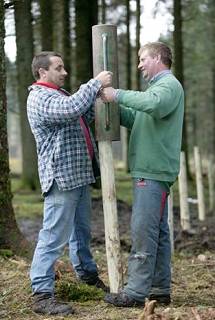
(Photo: Angel Tomney)
In January 2004 the Forestry Commission agreed to take on two prisoners for voluntary work experience as part of the HMP Dartmoor Prisoner Resettlement Programme. Dartmoor Prison at Princetown, Devon, is a category C training prison with a stage 1 and 2 Resettlement Unit. The two prisoners worked as an integral part of the Dartmoor field team participating in a wide range of practical forest management tasks. From a very early stage this proved a popular arrangement with the prisoners, HMP Dartmoor and Forestry Commission. Following this Forestry Commission England agreed to provide Stage 1 Resettlement programme opportunities incorporating a varied programme of (unpaid) work experience combined with nationally accredited training in specialist skills, particularly clearing saw work and chainsaws.
In July 2004 HMP Dartmoor secured Home Office approval to provide a Stage 2 Resettlement Programme. Along with more personal freedom inside the prison, Stage 2 offers the opportunity for participants to earn a regular ‘wage’ for work undertaken. Money earned is then retained in a dedicated account for the prisoner administered by HMP Dartmoor and only available to them on release (to break out of the viscous cycle of ‘no job’, ‘nowhere to live’ and ‘no money’).
After the first 3-year trial period (steps 1 to 4 below) which finished end of 2006, the second 3-year programme will have an additional stage (step 5) for those offenders who are interested to continue work with the Forestry Commission after release. The steps are thus:
- Suitable offenders selected by HMP Dartmoor Resettlement Unit.
- Voluntary work is completed (4 to 6 weeks) with the Dartmoor Forest Beat team and each prisoner’s suitability for further work experience assessed (Stage 1).
- Entry into the Stage 2 resettlement scheme – a paid work experience and skills training scheme (typically 6 months in duration).
- Offender released with the benefit of money in a bank account, new skills and an employment reference.
- An optional 3-month employment contract with the Forestry Commission is offered to ex-offenders who have satisfactorily performed during steps 1 to 3 above. This option will be available to start immediately following release.
By the end of March 2006 nine prisoners took part in the project; all of them found employment or a training position within the first six months of release and only one was accused of an offence following release but received a ‘not guilty’ verdict. An important by-product of this initiative has been the environmental benefits resulting from over 7 kilometres of streamside biodiversity improvements.
Funding for the scheme has come from Dartmoor National Park Sustainability Fund, Forest Enterprise and Devon Renaissance.
Contact: David West (Forestry Commission), tel: 01392 834205.
Case study 2:
Forestry Commission South-East England Forest District – Winchester Prison Initiative
Offenders from HMP Winchester working on Forestry Commission land to widen one of the rides in Micheldever Wood
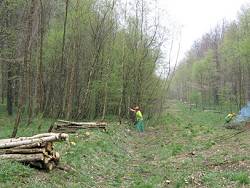
(Photo: Ben Phelan, Forestry Commission)
As for many other initiatives the first contact came from the prison management requesting the Forestry Commission to develop a scheme similar to the Dartmoor one (see Case study 1). The initiative took just over a year of planning and negotiations to set up and has a memorandum of understanding in operation outlining rights and responsibilities of the participating partners and financial and in kind contributions to the running of the scheme.
The first placements started in early 2006 after having recruited a well suited supervisor to be in charge of the day-to-day running of the scheme, training and mentoring the offenders, and making sure that health and safety procedures are adhered to. The original plan was to have 6 to 8 offenders who would work full-time for 6 to 12 months, receiving training to use clearing saws and chainsaws. As HMP Winchester’s resettlement unit had difficulties finding several offenders to participate in the scheme, only 2 people ended up working for 6 months, with 3 dropping out early on due to unstable health, prison policies and a drugs issue. Resettlement practices are staged and offenders are only allowed to work outside Winchester prison in their last 6 to 8 months of their custodial sentence; thus placements will generally last a maximum (rather than minimum) of 6 months.
So far only hand-held tools have been used and this was found to favour a more refined and traditional approach to forest management. In addition, links are established with Sparsholt College and BTCV to be able to offer accredited skills training (e.g. use and maintenance of chainsaws). In terms of ways of working and forest management, the use of hand tools would not be normal practice as the labour time needed for the work is cost-intensive and now usually regarded as a luxury that neither the Forestry Commission nor a contractor would provide. Here however, it meant that with relatively little training, a lot of work could be carried out at less risk to the workers (less dangerous than chainsaws and hacksaws) and with a neater finish of the work. The immediate appreciation by the public of the work done helped keep up the motivation. This positive feel was also carried back into the prison (worthwhile work) and the offenders gained respect of the prison staff in terms of the effort and stamina it requires to carry out the work.
Physical and mental health benefits and enjoyment are felt to be central in O&N placements even if prisoners do not choose a career in the land-based employment sector. During their voluntary work the offenders became more confident and gained a more positive outlook. However, some carry with them a great deal of frustration and many problems, and underneath there still seem to linger issues that may prove difficult for some of the offenders once released. It is therefore important to keep paying attention to a whole range of factors, and while O&N schemes can help with many aspects, they are one among many other initiatives and programmes to aid rehabilitation.
Contact: Nick Hazlitt (Forestry Commission), email: nick.hazlitt@forestry.gsi.gov.uk
Case study 3:
Natural England’s ‘Working with Prisoners’ Initiative
Prisoners from HMP Springhill improving a public footpath
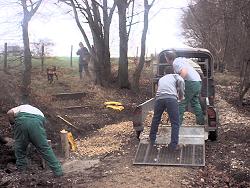
(Photo: English Nature)
English Nature (now Natural England) started working with prisoners in 2003. Inmates from HMP Springhill helped at Aston Rowant National Nature Reserve (NNR) in Oxfordshire and established a tree nursery in the prison grounds. In November 2003, at Barton Hills NNR in Bedfordshire, prisoners from Springhill Open Prison at Grendon Underwood came to erect fencing in the first of a series of regular work sessions. In 2004, one prisoner worked at Aston Rowant NNR for 40 days towards an NVQ in environment conservation. Another scheme operates at the Ribble Estuary NNR working with inmates from HMP Kirkham in Lancashire on brownfield land within the prison.
Contact: Alan Pearsons (Natural England), email: alan.pearsons@naturalengland.org.uk
Case study 4:
Prisoner Rehabilitation Initiative in North-West England
The Forestry Commission and the Government Office for the North West initiated a pilot ‘working out project’ with Haverigg Prison in Cumbria. The project delivery partners consist of Natural England, the National Trust and the Forestry Commission (North West England Forest District). Haverigg is a category C training prison and offenders carry out conservation and forest management work on different sites belonging to the initiative’s delivery partners, all within 1 hour’s travel of the prison.
Work has started to develop a strategic plan for extending this approach to other prisons in the region. To achieve this the Government Office for the North West and the Forestry Commission are currently working with several partners in the region, including the:
- Prison Service
- Northwest Regional Development Agency
- National Offender Management Service
- Probation Service
- Healthy Settings Unit at the University of Central Lancashire
- British Trust for Conservation Volunteers
- Learning and Skills Council
- ‘Innovation Means Prisons and Community Together’ (IMPACT) Project which is funded by the European Social Fund under the ‘EQUAL’ initiative.
The focus is on developing the skill base of offenders, both practical skills and personal skills, with the long-term aims of reducing re-offending and improving health and well-being.
There have been some practical problems for the prison, such as pressure on inmates (and their families) who were going out to bring back drugs for other inmates. The prison developed various ways of managing this, such as selecting individuals randomly for working teams on a daily basis from the pool of licenced prisoners. Now, a separate unit, which is totally isolated from the rest of the prison, has been built to house a dedicated team of prisoners who participate in the Offenders and Nature schemes.
Contact: Penny Oliver (Forestry Commission)
Case study 5:
Forestry Commission’s Participation in ‘Project Scotland’
Galloway District of the Forestry Commission Scotland obtained funding from ‘Project Scotland’ to offer volunteer placements and training to young disadvantaged, marginalised and academically low performing young people. The scheme started in October 2005 and while not actively targeting offenders, it is open to young offenders to apply to the scheme. Recruitment and mentoring is carried out by Volunteer Centre South Ayrshire. Young people sign on as conservation volunteers for at least three months, with the option to stay for a whole year. The aim is to help youngsters gain work-based skills and qualifications to enhance, if appropriate, their chances of employability in the land-based industry sector, and more generally to increase their confidence, raise their self-esteem and help them become active citizens. In addition to learning about path creation and management, tree planting, chemical weeding, tree felling using chainsaws and similar forest and land management skills, there is also an emphasis for the young volunteers to participate in team-building activities such as mountain biking, playing football and paint balling.
In their first year of operation about 20 young people participated with less than 10% dropping out during the ‘taster week’. Those having successfully completed their first six months can apply for a grant of up to £1,500 for personal development (often used towards getting a driving licence, and purchasing a chainsaw kit, or attending an overseas conservation camp). The first year included a wide range of personalities, but those expressing violence or involved with drugs are thrown off the project. The scheme is now in its second year, and to date has had 38 young people participate.
Contact: Lyndy Renwick (Forestry Commission)
Case study 6:
Forestry Commission Northants District – Young Offenders and Probationers Initiative
Offenders from Young Offender Institutes and the Probation Services attend regular work groups at Rockingham Forest and Kesteven Forest working with the Forestry Commission and partners, including a coppice contractor. Forestry Commission is looking to develop the project to include mountain bike courses, anti-drugs workshops and related training facilities in joint partnership with the Northamptonshire Young Offenders Team and the wider public. Forestry Commission staff are also looking into setting up a social training wood craft workshop and linking work with a sawmill facility to give basic skills to excluded children and other disaffected youngsters to help them into work programmes.
Forestry Commission are also in discussion with the Home Office regarding a project to have ‘hard case’ asylum seekers coming out to do conservation work on a voluntary basis. A report was submitted to Ministers and the indication is that they would back and help fund such scheme. It would be a pilot study for 12 months, to be offered across all districts if successful.
Contact(s): Cheryl Joyce (Forestry Commission)
Policy context of ‘Offenders and Nature’ schemes
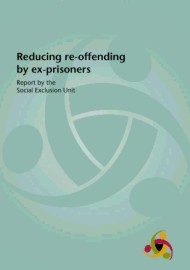
“We have to make preventing re-offending the centre of the organisation of our correctional services. We have to make reducing the number of re-offenders the central focus of our policy and practice”
Charles Clarke (then Home Secretary): ‘Where Next for Penal Policy?’ speech to the Prison Reform Trust, September 2005
Re-offending rates
Around 60% of convicted offenders are being re-convicted within two years after completing their prison or community sentence. Re-offending rates for young offenders aged 18-21 and male adolescents (aged 15-18) are particularly high, at 73% and 82% respectively.
The influential Social Exclusion Unit (SEU) report on ‘Reducing Re-offending by Ex-Prisoners’ put the cost to society of re-offending by ex-prisoners at £11billion per year.
Factors
The SEU report emphasises the extent to which people with ‘chaotic lives’ and from backgrounds of deprivation fall into crime as a consequence of unemployment and lack of skills and qualifications. Poor literacy and numeracy skills significantly reduce the chances of many offenders finding employment after release.
Other key factors for re-offending are:
- Breakdown of family relationships and homelessness
- Mental health problems
- Addictions to drugs or alcohol.
Government initiatives
In November 2005, the Home Office launched three ‘Reducing Re-Offending Alliances’ with the Civic Society, Corporate, Faith and Voluntary sectors with the aim of involving a wider range of people and organisations in the reducing re-offending agenda. At the same time a ‘Community Payback’ drive was launched to raise the profile of offenders’ community service work as a restitution to local communities.
‘Offenders & Nature’ (O&N) projects offer such placements. They have long been a main element in local probation and youth offender community service programmes with a multitude of anecdotal accounts that highlight the schemes’ positive effects.
Motivation of natural environment organisations
Natural environment organisations want as many people as possible to experience, enjoy and benefit from nature. Many of the organisations interested in O&N projects own or manage nature reserves or recreational countryside, and work with a variety of volunteering activities – some motivated by looking after the landscape, others focusing on what education, skills, enjoyment, health or other benefits the volunteers gain from the activity.
Thus, offenders’ community payback schemes form part of a spectrum of environmental voluntary work, and of organisations’ frameworks for managing volunteers.
Publications and resources about ‘Offenders and Nature’ schemes
Available/published
- SERG_Offenders_and_nature_research_summary.pdf (PDF-698K)
Research summary – 2 pages - Offenders_and_Nature_Leaflet.pdf (PDF-208K)
Information sheet featuring the Bedgebury and Dartmoor schemes – 2 pages - Information sheet – Dartmoor Prison Scheme (PDF-124K)
Information sheet – 2 pages - Employment for ex-offenders: an innovative approach (PDF-302K)
Employment for ex-offenders: an innovative approach
Information sheet – 4 pages - Offenders and Nature: Helping people, helping nature (PDF-588K)
August 2007 – 12 pages - Information sheet – Winchester Prison Scheme (PDF-148K)
Information sheet – 2 pages
In preparation
We are currently putting together guidelines to help new schemes get off the ground more quickly, with better information and contacts for support.
Forest Research is currently working on a report to be published spring 2009 detailing the policy, academic and practical background to Offenders and Nature schemes and discussing barriers and potential ways to address these.
